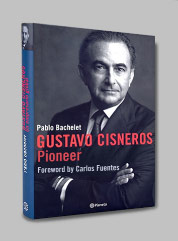Summary
The book profiles Mr. Cisneros’ life and career, showing him as a forward-looking entrepreneur, committed to the values and goals of individual freedom, democracy and social justice. The work advances along four main paths:
1. The international expansion of the Cisneros organization, which began as a Venezuelan-based group and then grew into an international consortium with significant links to Venezuela. This process of expansion has been led by Mr. Cisneros with a view to the key tendencies now defining the international framework for businesses.
2. The development of a sense of mission by a captain of industry who conceives his role as the creation of wealth for the benefit of society, through the generation of jobs, technological innovation, and the prosperity of individuals and communities.
3. The commitment on Mr. and Mrs. Cisneros’ part, and of the Cisneros organization as a whole, to the values and achievements of the Hispanic world’s cultural heritage, the Spanish language, and the artistic and literary legacy of Latin America, including its indigenous communities. This includes also Mr. and Mrs. Cisneros’ strong support for the unity of the Americas, Spain and Portugal, and for the economic and cultural integration between the Hispanic world in general and the Hispanic community in the united states in particular.
4. The development by Mr. Cisneros of a characteristic way of doing businesses, based on calculated risks, the preeminence of the human factor in wealth-creation, a flexible managerial style, a balance between daring and cautiousness, the will to learn from both successes and errors, and a dedication to excellency.
The book begins with a brief retelling of the birth of the Cisneros organization, initially created by Mr. Diego Cisneros, the father of Gustavo Cisneros, and of its growth until the moment when Gustavo and his brother Ricardo Cisneros took the helm. It follows the course of events through the sixties and seventies, highlighting key stages in the fast ascent of the Cisneros organization, first in Venezuela and then in other parts of the world. It analyzes Gustavo Cisneros’ decision, taken in the early eighties, to expand on a global scale, and discusses the complex challenges faced by the group in those exciting times.
The author emphasizes fundamental junctures along the way of the Cisneros organization’s course of international consolidation, and comments upon vital business decisions which showed vision and courage on the part of Mr. Cisneros and his team. It describes, among others, the cases of Univision, DirecTV Latin America, AOL Latin America, and goes into detail on such fascinating stories as the purchase of the chain of department stores “Galerías Preciados” in Spain, the alliance with Coke, and the launching of “Regional”, a new beer brand in Venezuela. All this is told while trying to illuminate the lessons provided by these experiences in the field of management, operational planning, and business performance.
The book deals extensively with Mr. Cisneros’ efforts to strengthen the unity of the Spanish speaking world through such initiatives as Univision and DirecTV Latin America, and his and Mrs. Cisneros’ large-scale educational projects such as the cl@se tv channel and AME, a teachers’ training program for the Latin American region. The book also covers the activities of the Cisneros foundation in the fields of promoting and conserving the artistic legacy of Latin America, and refers to the “Cisneros Collection” of paintings and the “Orinoco Collection” of indigenous arts and crafts.
In its concluding sections the book attempts to summarize its main findings, describing the Cisneros business group and its leader as positive factors in the social and economic development of the communities with which they interact.
In the course of writing it, the author conducted more than one hundred interviews and researched a mass of archives, publications, and collections of documents related to his subject. |

